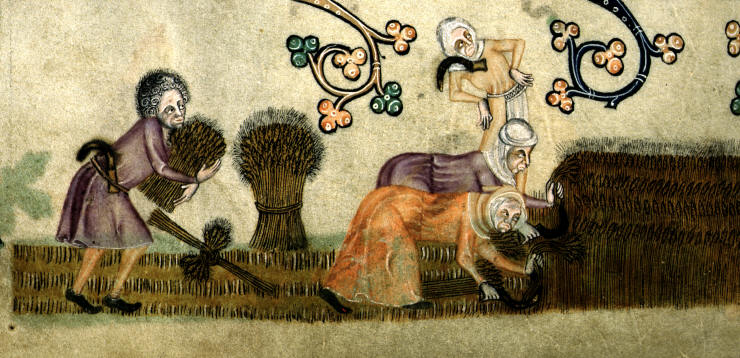Gospel For Today: 5th Sunday of Lent
FIFTH SUNDAY OF LENT (B)

In today’s gospel reading (Jn 12:20-33), Jesus speaks of His coming glorification in terms of death and life. “Unless a grain of wheat falls to the ground and dies, it remains just a grain of wheat; but if it dies, it produces much fruit. Whoever loves his life loses it, and whoever hates his life in this world will preserve it for eternal life.”
Is Jesus speaking in paradox? In order to save our life we must die? What sort of sense does that make? Jesus illustrates His point beautifully with the grain of wheat. A grain of wheat, on its own, is a pretty useless thing. In order to become what it was meant to be, it has to be buried in the ground — a kind of death. Then and only then will the seed become the plant it was meant to be. It is no accident that Jesus chose wheat to illustrate His point. Once grown the wheat is harvested and made into bread to feed others. By falling to the ground and dying, that little grain has become something that gives life to many.
We are also called to sacrifice ourselves for the good of others. No, I am not necessarily talking about taking a bullet for someone. I am talking about the little ways we are called to sacrifice our time, talent and treasure for the good of those around us every day. We are called to be self-less, not selfish.
Have you ever noticed that those who are overly concerned with self-fulfillment (“finding themselves”), and “getting their due” out of life are seldom happy? They tend to be more brooding and angst-ridden. Whereas those who practice self-discipline and self-sacrifice in order to help others seem far happier and more at ease with themselves.
Viktor Frankl was an Austrian neurologist and psychiatrist, and also a Holocaust survivor. In 1941, Frankl applied for and was granted a visa to the US. The Nazis had already started to round up the Jewish people in Austria for the concentration camps, starting with the elderly. Frankl knew that he could go to America and escape the danger, but that would mean leaving his parents behind. He went to St. Stephen’s Cathedral in Vienna to pray about his decision. When he returned home, he found a piece of marble rubble from a local synagogue that the Nazis had destroyed. Engraved on the rubble was a fragment of the fourth Commandment — honor thy father and mother. Viktor Frankl stayed in Austria to be with his parents.
They were sent, as expected, to the concentration camps. While there, Frankl observed that those who fared the best in those conditions of extreme suffering were those who understood that being human means being directed to someone or something other than one’s self. They were the ones who were living for something greater than their own happiness and comfort. Later in life, in his psychiatric practice, Frankl would help people overcome depression by helping them to find meaning in life outside of themselves.
Christ also directs us outside of ourselves. In summarizing the Ten Commandments, Christ tells us two things: we must love our neighbors, but first and foremost we must love God. Those two must always go together, the horizontal and vertical aspects of Christianity. If we live only for ourselves, we miss both.
This is the key to unlocking Jesus’ seeming paradox. If we love our own life too much, if we live only for our self and our own happiness, then we cannot grow. We will remain a (fairly boring and useless) grain of wheat. And ironically, we’ll be pretty miserable. (Some have described hell as an eternity trapped within ourselves.)
But if we are willing to sacrifice for the good of others — as Christ was willing to do for us — if we love God and neighbor above our own comfort — then not only will we preserve our life but we will find that blessed peace and eternal happiness for which we each were made.
—

WCU Catholic Campus Ministry
Matthew Newsome, MTh, campus minister
(828)293-9374 | POB 2766, Cullowhee NC 28723

